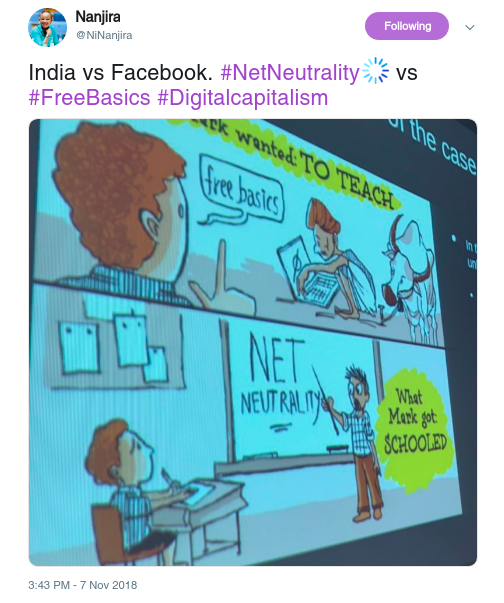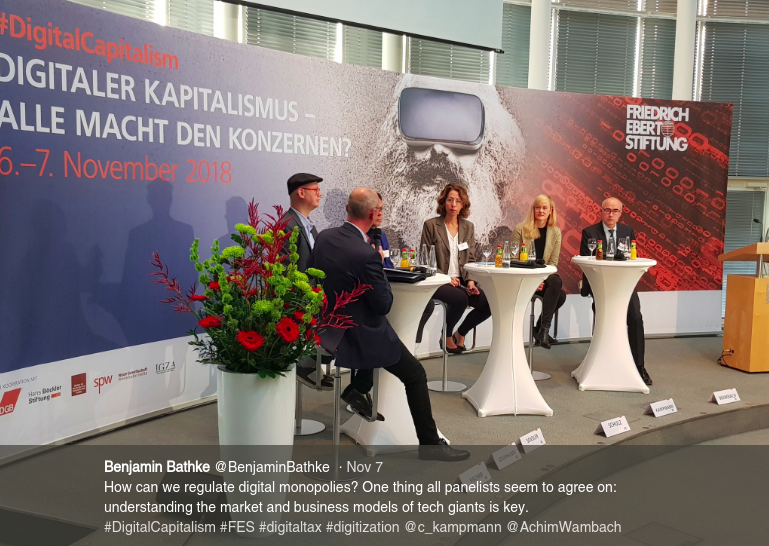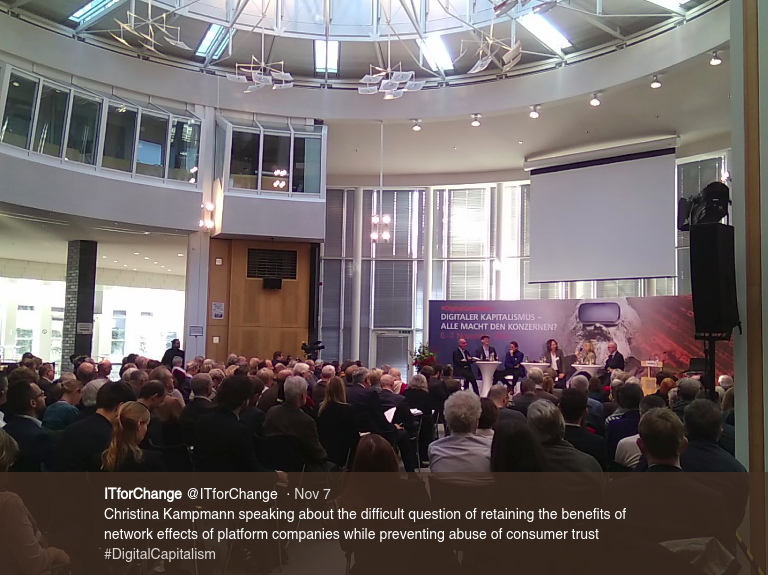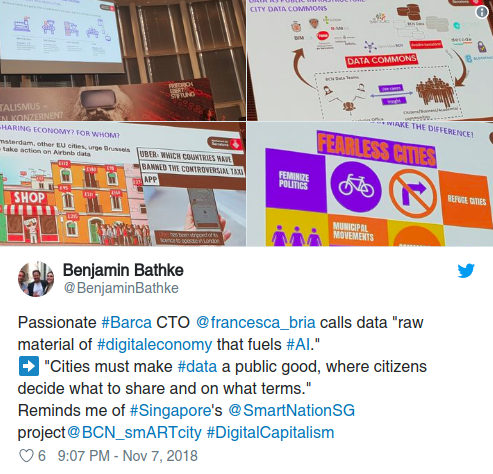1. Looking beyond the status-quo
The digital revolution that initially promised to be a socio-economic leveller has ironically become the harbinger of a new global socio-economic order of unprecedented exploitation and injustice. The Internet is a far cry from the plural, diverse and democratic communication architecture that the millennial generation optimistically aspired for. In the digital markets of today, mobile and cloud technologies have led to the proliferation of “walled gardens”; the carving up of the digital commons into proprietary platforms that seek to lock in users permanently. The initial impetus for such platformisation came from the quest of digital corporations to maximise click-bait revenues by leveraging demand-side economies of scale and data-based profiling for targeted advertising to a captive user base. But the business model of these corporations has now moved beyond advertising to the deployment of their ‘platform advantage’ - the creation of intelligence-based solutions, based on massive user data repositories built over time. Google, as Morozov notes, sees its future in its Cloud Auto ML suite of customisable machine learning products for businesses developed from the existing behavioural data sets it owns and controls, rather than its ad revenues from web search.

Source: The Economist
The new vistas that data as raw material and digital intelligence solutions as a new factor of production have opened up implies a complete overhaul of the marketplace. Not only Big Tech, but even traditional corporate giants are reinventing their game through Big Data based control. Take the case of the agricultural sector. Even as Alibaba is strengthening its AI-supported ET Agricultural Brain platform, agro-chemicals corporation, Bayer, has taken over Monsanto, the seed behemoth. With the acquisition, Bayer is aiming to create a one-stop shop for seeds, crop chemicals and computer-aided services to farmers, with an eye on consolidating its hold over the farm supplies industry.
Platformisation has become the order of the day in every domain: agriculture, retail trade, transportation, tourism, banking, finance, on-demand services; name it, and you can spot it. This shift has fostered monopolistic tendencies and market concentration across the economy. Today, companies with more than USD one billion in annual revenue account for nearly 60 percent of total global revenue and 65 percent of market capitalisation. Big Tech companies are on top of this heap, occupying five of the top 10 slots in the list of the largest companies in the world by market cap. They often abuse this enormous power they wield, through pervasive dataveillance of users and workers, cavalier violations of and a total disregard for national legislation in the markets they operate, including brazen violation of competition law.
What should our response be to this scenario of ‘all power to corporations’? How must we respond to the deeply inimical consequences of the intertwining of the digital revolution with neo-liberal capitalism? Can we reclaim the emancipatory power of Internet and data technologies to build an equal and inclusive digital future? These questions were at the heart of the 2018 edition of the #DigitalCapitalism conference organised by Friedrich Ebert Stifung on November 6th and 7th, in Berlin, Germany.
This blog brings together reflections from IT for Change’s participation in the conference. For sessions where German to English translation was not available, points have been drawn from a scan of the live blog and Twitter feeds.
2. An equitable and inclusive digital future - reflections from Forum 1.7. The Internet between emancipation and dystopia?
Forum 1.7 in which Anita Gurumurthy from IT for Change was a panelist, focused on how differential experiences of countries of the Global South and North must be adequately accounted for in exploring the emancipatory potential of Internet and data technologies. Each of the three panelists brought in a different geo-political perspective to this issue – Nanjira Sambuli, Web Foundation, brought in an East African perspective; Anita Gurumurthy, IT for Change, came to the debate from an Indian standpoint; and Geraldine de Bastion, Konnektiv, examined the EU approach, with a specific focus on Germany.
|
|
|
Key insights from the presentations and audience discussions at Forum 1.7 are summarised below:
(i) The idea of the Internet has shrunk to a narrow platform ecosystem, a far cry from the original imaginary of the web. Nanjira Sambuli spoke about how the lack of public investment in access infrastructure in the African continent has enabled the rise and rise of Free Basics and produced large user groups who have no idea that there is a plural and diverse web outside the narrow ecosystem of Facebook apps.
Anita Gurumurthy concurred and spoke about how in the Indian context, such ‘lock-in’ into platforms on the mobile Internet continues to be a threat despite the ban on zero services such as Free Basics instituted by the telecom regulator. India’s current net neutrality framework provides an exemption for Content Delivery Networks operated by telecommunications operators. This opens up possibilities for market concentration through vertical integration, and leading telecom companies, such as Reliance Jio, cover over 42% of the current Internet subscriber base in India. Subscription to Jio’s Internet services is contingent on the purchase of a phone with locked-in hardware on which Reliance runs its own video content channels.
Geraldine de Bastion reflected on the difficulties of FOSS advocates creating alternative apps and platform services to dominant ones, stemming from the unholy nexus between governments and powerful platform companies. For example, the Signal app, a completely encrypted messenger app deployed as an anti-censorship tool by political activists has been kicked off Google’s APP engine and Amazon’s cloudfront web services due to pressure from governments.
(ii) The struggle for Internet emancipation is now the struggle against data extractivism. Anita Gurumurthy spoke to how the primary challenge confronting us is no longer the ad-based revenue model for content services adopted by platform companies; it is a new business model predicated on digital intelligence solutions – both prepackaged and business-specific – that Big Tech companies offer for wide application across industries. Digital corporations located in countries of the Global North rely upon unrestricted cross-border data flows to consolidate their hold over markets of the Global South. Through multilateral and plurilateral trade negotiations on e-commerce, powerful countries hope to entrench a global regime of data flows that will give them access to user data in the Global South. The Indian government has questioned this hegemonic policy framework at the WTO and argued the importance of national data sovereignty and room for policy maneuver to resist digital colonisation at the hands of American and Chinese companies.
Anita also noted that developing country governments need to invest in building a supportive institutional environment for national-level data innovation. India, for instance, lacks the open data sets and data sandboxes that can be leveraged by AI start-ups. Its algorithmic patents regime fails to distinguish between ordinary algorithms and AI algorithms, which can be a barrier for innovations in the data economy. The government’s own estimates have pointed to the lack of workforce capacities in AI; only 4% of India’s AI engineers are skilled in technologies such as deep learning. Public procurement strategies related to ‘AI in governance’ solutions also fail to provide for quotas for domestic innovators. In Smart City programmes and AI in agriculture initiatives of state governments, the trend has been to opt for PPPs with transnational digital corporations.
Geraldine de Bastion agreed with this view, highlighting how the project of Internet emancipation is now inseparable from that of weaving a new policy narrative on data that is cognisant of the international political economy of data in digital capitalism. She also said that this new narrative should not stop with a clarion call for regulating Big Tech. It would be equally important to focus on investing in an institutional ecosystem for data innovation – and this is what the missing piece seems to be in Germany. The country has millions and millions of funds collected as public broadcast fees but this goes completely unspent. This is a wasted opportunity for nurturing data innovations rooted in FOSS ideologies.
Nanjira Sambuli observed that in the African context, the collusion between governments and Big Tech continues to be a challenge in fighting against the repression of fundamental political freedoms in data extractivism.
(iii) Digital emancipation can work only if experiences of the Global South are foregrounded. Geraldine de Bastion spoke about how countries of the Global South may have far more evolved and sophisticated responses to issues pertaining to digital emancipation than countries from the Global North. For example, in the net neutrality debate, India is miles ahead of the United States. Similarly, Kenya may be ahead of Germany as far as thinking on white space allocation is concerned.
Anita Gurumurthy highlighted that we need to move the debate to the democratisation of production and distribution in the data economy, shedding an exclusive focus on the democratisation of consumption (as is often the case in European narratives about the sharing economy). For instance, a country like India has a vibrant history of platform cooperatives in the dairy sector. As e-commerce companies and agri-tech platforms entrench themselves in agricultural input and output markets, the marginal farmer is likely to face a livelihoods squeeze. Can we evolve digital intelligence that will enhance the market power of farmer and dairy cooperatives, instead? How should we structure the institutions of the data economy to support such innovations?
3. Key discussion threads from other sessions
(i) Reject the hegemonic digital policy visions promoted by the US Big Tech lobby. In his keynote, Adam Greenfield highlighted how the fiction of a digital economy fueled by perpetually upward spiralling consumption must be challenged. The inhuman working conditions in the Chinese factories producing the hardware for US tech giants, the celebration of a society decoupled from human worth, the rise of an economy that does not serve the interests of human labour, and the transvaluation of all social values – this is where the American model of Big Tech-backed digital revolution has got us.
In her keynote, Susan Crawford reflected on how the consistent undermining of public investment in access infrastructure and the de-legitimisation of economic policy oversight is the most pernicious effect of the Big Tech lobby on the digital policy environment. One of her students at Harvard recently shocked her with an earnest question – “Why do we need government at all? Can’t the private sector just take over its functions and do it more efficiently?” She highlighted that unless this imaginary was foundationally challenged, it would not be possible to overcome the grotesque inequality of the emerging digital paradigm that manifests in extraordinarily unjust ways. 85% of Uber drivers in New York are simply unable to make the minimum monthly income they need to support their families.
(ii) Institute effective regulation to curb abuse of market power by the big digital monopolies. Achim Wambach, President of the German Monopolies Commission, reflected on the challenges of enforcing anti-trust regulation on digital monopolies. For instance, the EU’s Merger Control regulation prohibits mergers and acquisitions that would have distortionary effects on market competition, but Facebook was able to circumvent this and push its WhatsApp deal. In fact, Facebook submitted false statements to the European Commission during the 2014 hearings on the proposed merger. When the Commission detected this in 2017, the merger could not be undone and Facebook got away with a heavy fine. When instituting and enforcing anti-trust regulation, market dominance in and of itself cannot be challenged; it is only abuse of market power that can be curbed. In this area, the European Commission has made many inroads. In the July 2018 anti-trust ruling of the European Commission against Google, it was not market dominance in and of itself that was challenged. It was the specific competition restricting practices of the company that came under fire – illegal tying of Google search and browser apps, illegal payments to device manufactures and mobile network operators conditional on exclusive pre-installation of Google search, and illegal obstruction of development and distribution of competing Android operating systems. It is also important to note that at the national level too, Germany has been making key strides in this area and is not just looking to Brussels for everything. Under the new Competition Law 4.0 strategy, the German government is exploring strategies for specific sectoral investigations into newly emerging digital marketplaces, and regulating data sharing practices amongst competing enterprises working in the same sector that promote innovation without leading to cartelisation. A detailed paper will soon be released by the German Monopolies Commission in this regard.
Tackling tax evasion by digital monopolies was another area that was discussed in multiple panels, along with a pointer for European Union to urgently don the leadership mantle on this issue, considering that the US will block any attempts at an international treaty. Christina Kampmann, member of the North Rhine-Westphalia parliament and spokesperson for digital policy, spoke about the urgent need for introducing effective digital taxation regimes to tackle the current situation wherein digital corporations pay on average an effective tax rate of only 9.5 percent — compared to 23.2 percent for traditional businesses.
There was also a vibrant debate on whether to break up digital monopolies or nationalise them. For instance, Susan Crawford was of the view that the way forward was to break up monopolies through regulation, preventing vertical integration of transport and content layers (think AT & T and Time-Warner merger) or search and data services (think Google’s strategy). A firm should simply not be allowed to operate across digital layers. She also felt that another equally important strategy was for the government to invest extensively in unlimited, cheap, ubiquitous connectivity that could pave the way for creative innovations that completely disrupt the FANG model, which is a product of an age of scarce connectivity. [We are somewhat skeptical of the second strategy as it does not adequately account for the data power that FANG has already accumulated.] State control of digital monopolies through nationalisation was discussed by the representative of the German Trade Union confederation and some audience members with the caveat that it may not always lead to desirable outcomes as this move might end up replacing one kind of monopoly with another.
(iii) Chart data policy directions for a transformative economy of the future. The idea that governments and individual citizens should not end up subsidising the Big Data economy was an angle that came up implicitly and explicitly in many of the open discussions with the audience. But there were only a few speakers who focused on data policy directions for economic innovation and public value creation beyond the usual solution of data portability, which effectively sidesteps the issues of absence of platform neutrality and market domination by a select few corporations.
Arno Brandt of the NDS 3.0 network advocated a solidarity economy strategy for Germany that delineates pathways for innovations in data and digital intelligence, while setting clear boundaries for which businesses data models may be permissible and for which they should not be. Ulrich Sendler, independent consultant, argued for models that decouple data ownership from the provision of cloud services, such as what is being proposed by Siemens. As he put it: “Siemens takes a new approach. The company says: All the data that we collect in the cloud belongs to the customers, which is a completely different approach than what the Internet giants are following so far.”
Francesca Bria, Chief Technology and Digital Innovation Officer of Decidim Barcelona, a participatory bottom-up digital platform supporting the evolution of a Smart City from below, reflected on how a data architecture can produce social value. She corrected the misconception that the idea of a public goods data architecture meant a model that gave the state unrestrained access to citizen data. In fact, the very ethos of Decidim Barcelona is about moving away from conceptions of Smart Cities founded on surveillance capitalism to a data-based participatory planning model that provides citizens complete control over their own data, and the conditions under which they are sharing it. One simple step that Barcelona has taken in this direction is to ensure that in all technology contracts entered by the city government, there are clear clauses that specify public ownership of data. Another is investment in Project DECODE, a novel set of tools that combine “blockchain technology with attribute-based cryptography” to enable individual citizens to determine the extent of their contributions from personal IoT devices into the data commons that the city government is building to refine its policy proposals around housing, transportation, and sustainable energy. In Francesca’s powerful metaphor, “Data is commons just like air and water”.
(iv) Adopt social policies for an inclusive digital society. Representatives of the SPD and trade unions including IG Metall stressed the imperative for framing social policies that can respond to the growing labour crisis in the digital economy, resulting from the restructuring of the job market. Christina Schildmann from the Hans Bockler Foundation emphasised how the standard work week of 40 hours may need revisiting as AI-led automation takes away jobs. IG Metall representatives shared the good practice in Volkswagen of workers deciding to reduce working hours to prevent lay-offs, as person hours reduced with plant automation. Audience discussions interrogated the viability of universal basic income as a solution to this quandary. There was also a lot of interest in platform models such as SmartDe that focused on co-operativist organising of self-employed workers to strengthen collective bargaining power in the emerging work culture where full employment is disappearing and gigs are the new normal.
Another social policy question that came up was on tackling discrimination in AI-supported decision-making processes. The right to explanation as provided in the GDPR was seen as a part solution that did not fully address this problem. As Lorena Jaume-Pelasi from the Ethical Tech Society highlighted, “breaking down the process through which a machine learning algorithm arrives at decisions requires more than probabilistic input-output modelling. There is a lot of investment that is needed – as a separate protocol for explanation may have to be developed alongside. Then there is the associated development of the break-down of the technical jargon in which the explanation is produced into a language that laypersons understand.”
4. In lieu of a conclusion - EU’s role in shaping the directions of digital capitalism
If there was one clear message from the conference, it was that the heady utopia of toxic consumerism propelled by Big Tech has to be unequivocally rejected now, if planet and people are to sustain. An economic model that celebrates the Bitcoin network, which guzzles more electricity annually than the Republic of Ireland, as the pinnacle of distributed and decentralised organisation of economic transactions, is missing something very basic. A model based on “platformisation of the everyday and the financialisation of everything” cannot sustain as the way forward to organise productive activities. Digital capitalism urgently needs reining in.
However, in the solutions that were identified to forge a third alternative that rejects American and Chinese models of digital capitalism, the conference was silent on one major aspect – Europe’s role in shaping a new world order where Internet and data technologies can be harnessed for an equitable future, not just for European citizens, but for all peoples of the world, especially those in the global South.
It is imperative that the EU abandon its double-speak in matters of digital democracy. On the one hand, EU policymakers demonstrate extraordinary eagerness to preserve policy space at home to create effective anti-trust regulation, taxation laws, data protection legislation, and public goods data models. But in the global forums where digital trade policy is negotiated, they back US proposals that curtail the power of developing countries to chart their pathways for data sovereignty and digital industrialisation. More insidiously, the ‘adequacy clause’ of the EU GDPR becomes a bargaining chip to arm-twist developing countries and denying them access to the EU market on grounds of non-adequacy. This is but a schizoid approach. The EU must reiterate its vision of a ‘next generation, human-centric’ Internet grounded in democratic values on the world stage.
This is not just about the EU defending its democratic space in Internet and data governance. In a world increasingly threatened by extreme inequalities in digital capitalism, it is really about the EU playing its part to reclaim democracy and economic justice for people and planet as a whole.






